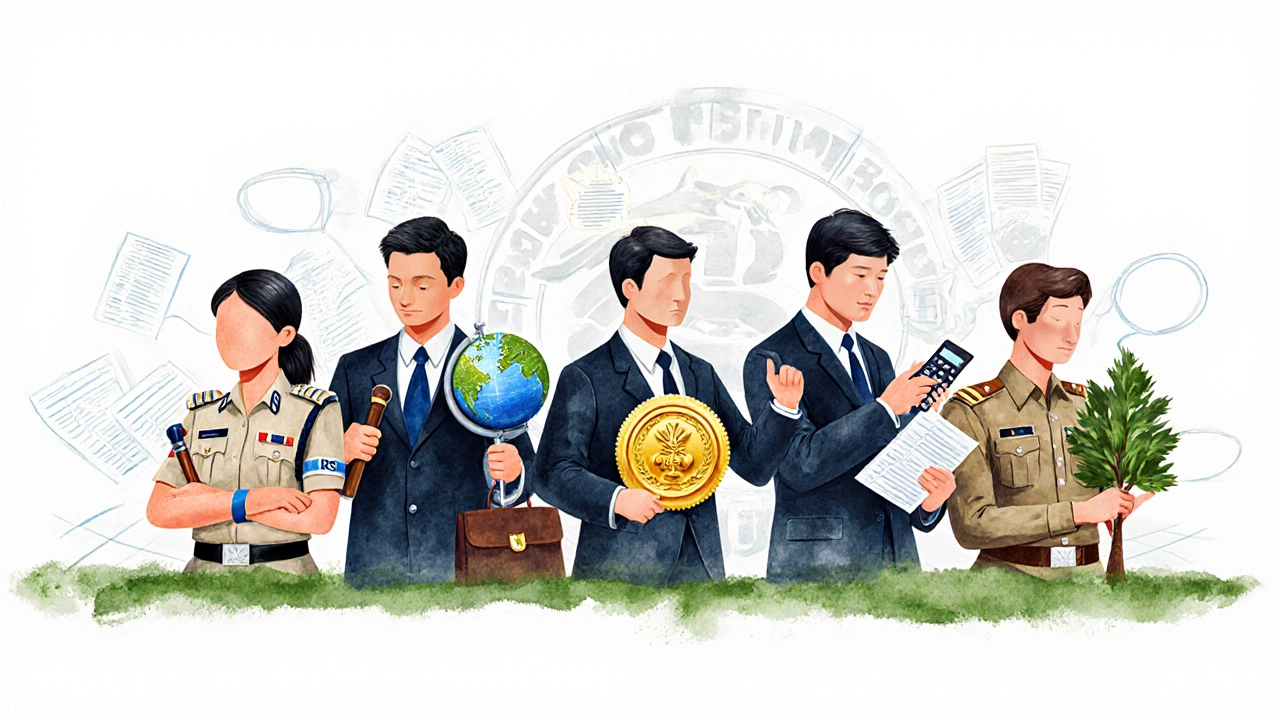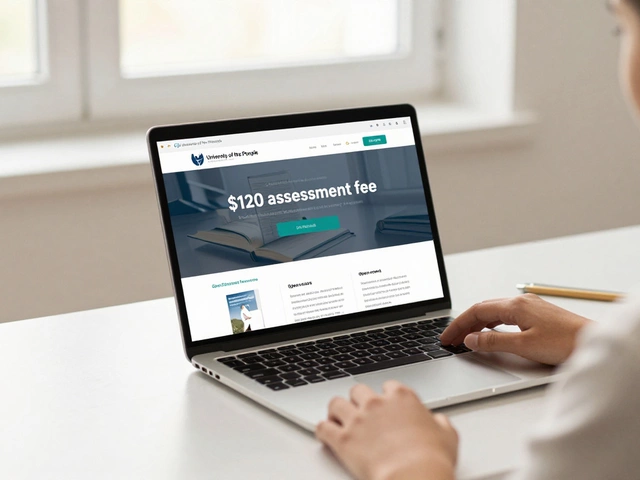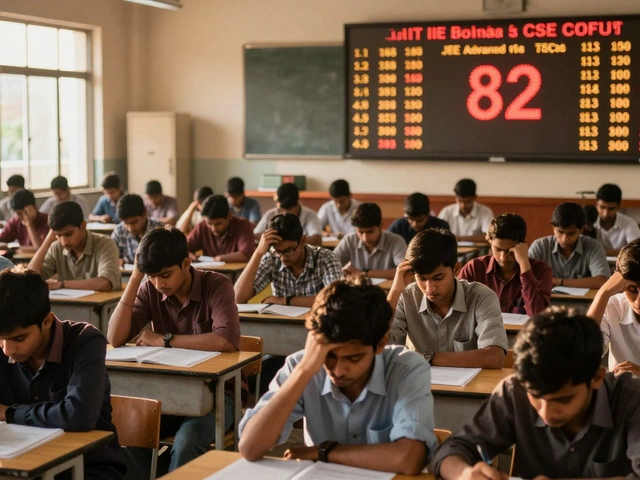Oct
26

- by Dhruv Ainsley
- 0 Comments
Civil Services Difficulty Calculator
Select Your Target Government Job
Difficulty Metrics
Competition Ratio
Select a job to view data
Syllabus Breadth
Select a job to view data
Selection Stages
Select a job to view data
Physical Test Required
Select a job to view data
Difficulty Level
Select a job to see your difficulty rating
Personalized Preparation Plan
Select a job to see your tailored preparation strategy
Ever wondered which government post makes you sweat the most during preparation? It’s not just about the pay scale - the sheer volume of syllabus, the cut‑throat competition, and the multi‑stage selection process separate the truly grueling jobs from the relatively easier ones. Below we break down the jobs that consistently rank as the hardest, why they’re so demanding, and how you can tackle each hurdle with a smart strategy.
How We Measure "Difficulty"
Before naming the toughest posts, let’s set the yardsticks. We look at three core factors:
- Competition Ratio - the number of aspirants per vacancy.
- Syllabus Breadth - range of subjects and depth required.
- Selection Stages - how many exams, interviews, or physical tests candidates must clear.
Jobs that score high on all three are the ones most candidates label as "impossible".
Top 5 Most Difficult Government Jobs
Here’s the lineup, ranked by how demanding the entire journey is - from prelims to final posting.
- Indian Administrative Service (IAS) - the crown jewel of the civil services. With a competition ratio of roughly 1:150 and a syllabus covering everything from Polity to Ethics, the IAS demands relentless preparation and an impeccable interview performance.
- Indian Police Service (IPS) - combines the rigorous UPSC written exams with a demanding physical endurance test and a high‑pressure interview that evaluates leadership in crisis.
- Indian Foreign Service (IFS) - requires mastery of International Relations, Geography, and multiple foreign languages, plus a diplomatic personality test that few candidates master.
- Indian Revenue Service (IRS) - tests deep knowledge of Taxation, Economics, and Law, with a competition ratio often worse than the IAS for the General category.
- Indian Forest Service (IFoS) - blends the UPSC paper with a specialized environmental science section and a tough interview focused on ecology and policy.
Why These Posts Are So Hard
Each of the five jobs shares a common set of challenges:
- Massive applicant pool: Millions appear for the UPSC Civil Services Examination (CSE) every year, making the odds razor‑thin.
- Multi‑disciplinary syllabus: From ancient Indian history to modern environmental law, candidates must be a jack‑of‑all‑trades.
- Intensive interview process: The Personality Test (or "Mains Interview") is a 30‑minute grilling that tests confidence, current affairs awareness, and ethical judgment.
- Physical test (IPS only): Candidates need to meet strict fitness standards, adding a whole new preparation dimension.
Missing any of these boxes usually means a fall at the final stage.
Preparation Blueprint for the Toughest Posts
Below is a step‑by‑step roadmap that works across all five jobs. Tailor the specifics to the service you aim for, but keep the core framework.
- Build a Foundation (Months 1‑3): Focus on NCERT textbooks (Class 6‑12) for History, Geography, Polity, and Economics. These are the bedrock for both prelims and mains.
- Curate Standard Reference Books (Months 4‑6): Choose one author per subject - e.g., Laxmikanth for Polity, Spectrum for History, and G.C. Leong for Geography. Avoid the temptation to read every book on the market.
- Current Affairs Mastery (Ongoing): Subscribe to a reputable monthly current‑affairs magazine, supplement with daily “The Hindu” editorial reading, and maintain a 6‑month summary notebook.
- Answer Writing Practice (Months 7‑9): Write at least 15 full‑length mains answers each week. Use a timer, stick to the 150‑word limit, and get feedback from a mentor or a peer group.
- Mock Tests & Analysis (Months 10‑12): Take full‑length UPSC mock exams every two weeks. Analyze every mistake - note if it was a knowledge gap or a time‑management issue.
- Interview & Physical Prep (Final 3‑4 months for IPS): Join a reputable interview coaching centre, practice mock interviews, and for IPS, follow a structured fitness regimen (running, push‑ups, endurance drills).
Stick to this timeline, and you’ll cover the massive syllabus without burning out.
Comparison of Difficulty Factors
| Job | Competition Ratio (approx.) | Syllabus Breadth (subjects) | Selection Stages | Physical Test Required |
|---|---|---|---|---|
| IAS | 1:150 | 9 (Polity, History, Geography, Economy, Ethics, etc.) | Prelims → Mains → Interview | No |
| IPS | 1:180 | 9 (same as IAS) | Prelims → Mains → Physical → Interview | Yes |
| IFS (Diplomatic) | 1:170 | 9 + Language(s) | Prelims → Mains → Interview | No |
| IRS | 1:200 | 7 (Polity, Economy, Tax Law, Ethics) | Prelims → Mains → Interview | No |
| IFoS | 1:190 | 8 (adds Environment & Ecology) | Prelims → Mains → Interview | No |

Common Pitfalls and How to Avoid Them
Even the best‑prepared candidates stumble. Recognise these traps early:
- Over‑reliance on YouTube: Video lectures are great for concepts but lack the depth needed for mains answer writing.
- Skipping Revision: The brain forgets fast; schedule at least two full‑cycle revisions before the exam.
- Neglecting Health: Long study hours without exercise lead to burnout - incorporate 30 minutes of cardio daily.
- Ignoring Personality Test Prep: Treat the interview like an exam; rehearse by answering past interview questions aloud.
Checklist: Are You Ready for the Toughest Posts?
- ✅ Completed NCERT‑based foundation for all core subjects.
- ✅ Selected and finished standard reference books for each subject.
- ✅ Maintained a 6‑month current‑affairs notebook.
- ✅ Written at least 400 mains answers with mentor feedback.
- ✅ Scored above 90 % in two full‑length mock exams.
- ✅ For IPS: passed the physical endurance test in practice runs.
- ✅ Conducted three mock interviews with a qualified coach.
If you can tick all the boxes, you’re in a strong position to take on the most difficult government job you’re targeting.
Next Steps After Clearing the Exam
Clearing the exam is just the beginning. Here’s what to do next:
- Join the official training academy (LBSNAA for IAS, Sardar Vallabhbhai Patel National Police Academy for IPS, etc.).
- Focus on on‑the‑job learning - administrative law for IAS, crisis management for IPS, diplomatic protocol for IFS.
- Build a professional network - connect with senior officers, attend policy workshops, and stay updated on government circulars.
- Plan your long‑term career - aim for key positions like Secretary, Director General, or Ambassador based on your interests.
Which government job has the highest competition ratio?
The Indian Administrative Service (IAS) consistently records the toughest competition ratio, often around 1:150, meaning only one candidate out of 150 clears the final stage.

Do I need a physical test to join the IAS?
No. The IAS selection involves only written exams and a personality interview. Physical tests are mandatory only for services like IPS and certain paramilitary cadres.
How much time should I allocate to current affairs?
Dedicate at least 2 hours daily to reading a reputable daily newspaper, plus 1 hour on a monthly current‑affairs compilation. Update your notes weekly.
Are there any shortcuts to crack the UPSC exams?
There are no real shortcuts. Success hinges on disciplined study, consistent revision, full‑length mock tests, and strong interview preparation.
What is the best way to prepare for the IPS physical test?
Follow a structured fitness plan that includes interval running, push‑ups, sit‑ups, and a swimming routine. Aim for the required standards at least six weeks before the test.





